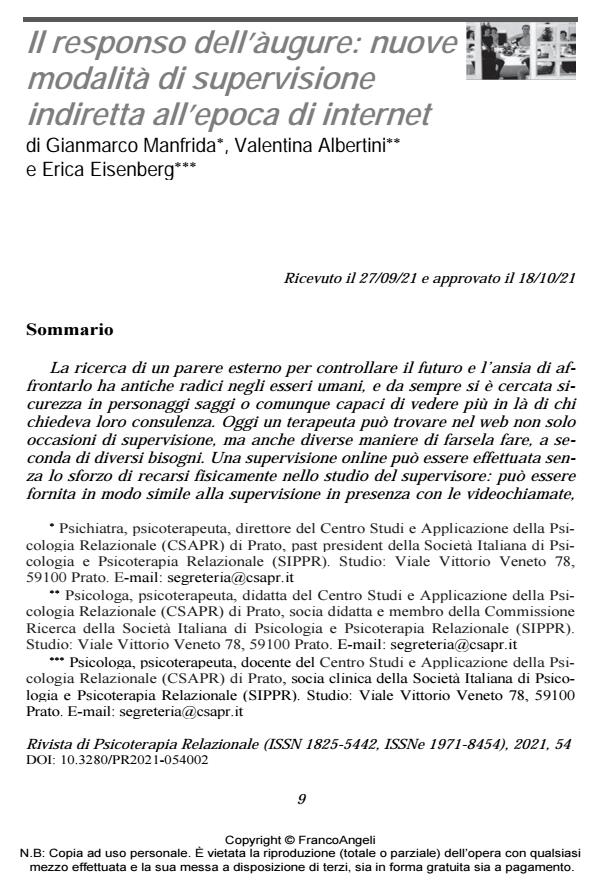The response of the haruspex: new ways to do indirect supervisions on the web
Journal title RIVISTA DI PSICOTERAPIA RELAZIONALE
Author/s Gianmarco Manfrida, Valentina Albertini, Erica Eisenberg
Publishing Year 2022 Issue 2021/54
Language Italian Pages 28 P. 9-36 File size 244 KB
DOI 10.3280/PR2021-054002
DOI is like a bar code for intellectual property: to have more infomation
click here
Below, you can see the article first page
If you want to buy this article in PDF format, you can do it, following the instructions to buy download credits

FrancoAngeli is member of Publishers International Linking Association, Inc (PILA), a not-for-profit association which run the CrossRef service enabling links to and from online scholarly content.
The need for advice in order to control one’s future and anxieties has ancient roots in human beings and safety has always been searched for in the opinion of wisemen, or anyway people capable of looking further. Online nowadays a therapist can findh not only help in form of su-pervision but also different ways of getting it according to different needs. Online supervision can be done without the effort to get physi-cally to the supervisor’s office; it can take place in a way similar to a consultation in presence by means of video calls or, in emergencies, of speed tips with instant messaging and social apps, or in a more de-tailed way with e-mails. Each of these new resources implies advantages and risks and should be chosen by the supervisor according to therapists’ and pa-tients’ actual needs. It is possible to understand personal reactions of therapists to their patients by the words they employ to describe them, from the style of their texting, from the punctuation they adopt as much as from their facial expression and eye movements. Distance changes elements to take into account in order to deduce an analogical feed-back giving access to therapists’ emotions and countertransference, but does not cancel, simply transforms them in ways compatible with the way indirect supervision online is being given. In this paper supervisions by video calls, e-mail, instant messaging and SMS will be described, in order to define technical points ade-quate or not for any of these different online contexts and eventual risks of online indirect supervision.
Keywords: online indirect supervision, psychotherapy, ICTs, apps, clinical work and didactics.
Gianmarco Manfrida, Valentina Albertini, Erica Eisenberg, Il responso dell’àugure: nuove modalità di supervisione indiretta all’epoca di internet in "RIVISTA DI PSICOTERAPIA RELAZIONALE " 54/2021, pp 9-36, DOI: 10.3280/PR2021-054002